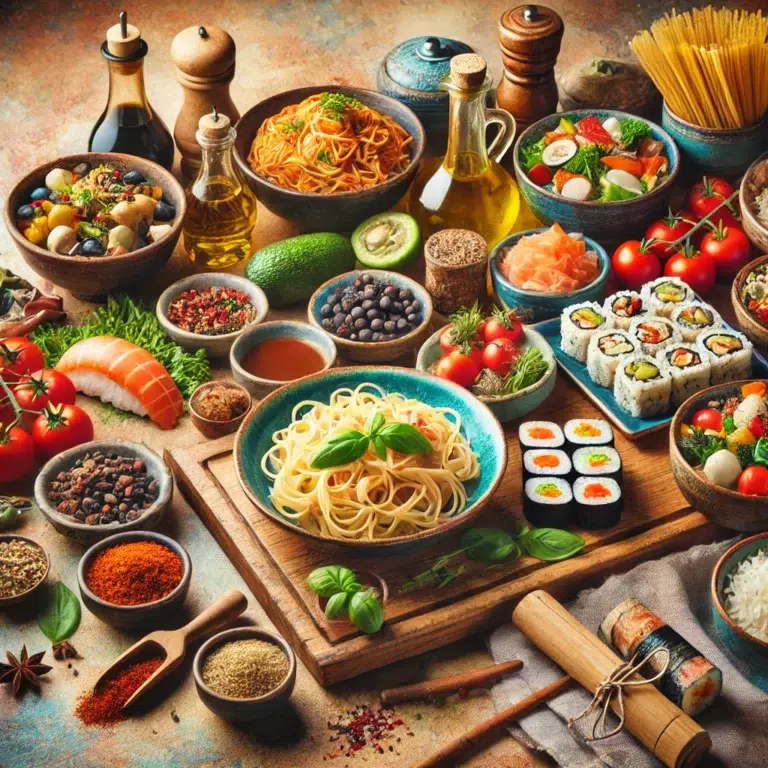Food is more than just sustenance; it’s an experience that connects us to diverse cultures, traditions, and flavors worldwide. For food enthusiasts, discovering new recipes, trying unique ingredients, and understanding different cooking techniques brings a fresh adventure every day. Whether you’re a passionate home cook or simply looking to elevate your meals, exploring food and culinary experiences opens up a variety of flavors and techniques that can transform your cooking.
Why Food and Culinary Experiences Matter in Modern Cuisine
In today’s world, food and culinary experiences offer a way to not only nourish our bodies but to connect with different cultures. From the Italian art of pasta-making to Japan’s intricate sushi traditions, every country has something unique to offer. Food and culinary experiences enrich our understanding of the world, making cooking an enjoyable and educational pursuit.
For more on global cuisine, see BBC Good Food.
Discovering Global Cuisines: A Taste of the World at Home
One of the best parts of exploring food and culinary experiences is trying new cuisines at home. From the comforting pasta dishes of Italy to the fiery curries of India and the delicate sushi of Japan, every region has unique flavors. Trying global cuisines can be as simple as finding a new recipe or experimenting with exotic spices.
Quick Tip: Start with spices commonly used in different cuisines. For example, adding cumin and coriander to your dishes can give them a Middle Eastern flavor, while lemongrass and ginger add the essence of Thai cuisine.
Enhancing Your Food and Culinary Experiences with Flavor Profiles
Understanding different flavor profiles can elevate your culinary experiences. Most dishes balance sweet, salty, sour, bitter, and umami flavors. Thai cuisine, for instance, combines sweet and sour through sugar and lime juice.
Learn more about flavor profiles from the Institute of Culinary Education.
Embracing Plant-Based and Sustainable Cooking
Sustainable cooking has become essential in today’s food and culinary landscape. Plant-based meals, like hearty lentil stews or grain bowls, support environmental sustainability while introducing fresh flavors and textures. Food and culinary experiences focused on plant-based diets also allow you to explore health-conscious options without sacrificing taste.
Recipe Idea: Try making a vibrant Buddha bowl. Start with quinoa or brown rice, add roasted vegetables like sweet potatoes and bell peppers, include chickpeas or tofu for protein, and top with a drizzle of tahini sauce.
Find more plant-based recipe ideas at Minimalist Baker.
Essential Kitchen Skills to Elevate Your Culinary Experiences
Sometimes, small techniques can make a big difference. Mastering basic kitchen skills, such as knife techniques, seasoning, and timing, can significantly improve your food and culinary experiences. Properly chopped vegetables cook more evenly, and correctly timed spices enhance aroma without overpowering a dish.
Quick Tip: Practice “mise en place” (organizing ingredients before cooking) to save time and keep the cooking process smooth.
Experimenting with Presentation for Culinary Art
Food presentation is an essential part of culinary experiences. A beautifully plated dish enhances the dining experience by appealing to the eyes as much as the taste buds. Experiment with arranging ingredients in creative ways to make meals visually enticing.
Tip: Use fresh herbs, colorful vegetables, or edible flowers to add aesthetic appeal to your dishes.
Conclusion: Embrace the World of Food and Culinary Experiences
Embarking on a journey through food and culinary experiences brings endless possibilities to your table. From experimenting with new flavors to learning culinary techniques, every meal becomes a unique experience that connects you to cultures worldwide. Cooking also brings mindfulness to everyday life, transforming a simple task into a moment of creativity and joy. So put on your chef’s hat, pick a new recipe, and enjoy the art of cooking!
Whether you’re cooking a traditional meal for family or exploring bold new flavors on your own, remember that every dish tells a story. Dive into the journey of food and culinary experiences, and savor each new taste as a memory in the making.
For more culinary techniques, visit Serious Eats.
Final Tips for Enhancing Your Food and Culinary Experiences
- Be Curious: Don’t be afraid to try new ingredients and methods. Every recipe is an opportunity to learn and create something uniquely your own.
- Invest in Quality Spices: Quality spices elevate any dish and can make a significant difference in flavor.
- Make It Social: Cooking with friends or family turns meal preparation into a joyful, shared experience that enhances culinary exploration.
- Experiment with Presentation: Try arranging your dishes in visually appealing ways. A beautiful presentation not only adds to the experience but also makes meals feel more special.
With these tips, you’re well-equipped to expand your culinary horizons. Enjoy the journey, and savor each new taste!




Pingback: Lifestyle and Wellness: 10 Tips for a Balanced and Healthy Life